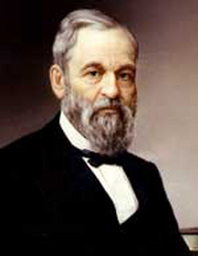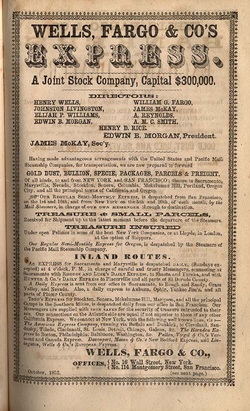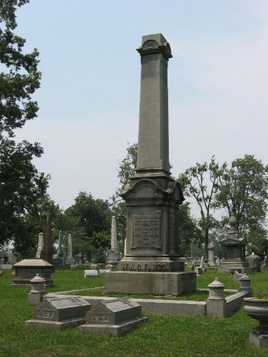William Fargo
William Fargo was born on May 20, 1818, in Pompey, New York and was the eldest of twelve children. His formal education ended at the age of 13, when he began carrying mail over a 30-mile circuit for a local contractor. For a period of time, Fargo had worked in the grocery business, as a baker, and in a village inn. Fargo later married Anna H. Williams in 1840 and had three children.
In 1842, Fargo became a messenger for an express firm operation from Albany to Buffalo. Through his association with Wells & Company, which operated the first express comapny west of Buffalo, Fargo became one of the founders of the American Express Company, which later became the largest express in the United States in a short amount of time.
In 1852, Fargo co-founded Wells, Fargo, & Company to bring the services of an express company to the gold mining towns of California. american Express and Wells Fargo combined the facilities to provide a fast transportation of goods and communication between California, the Atlantic Coast, Europe, and the places in between.
After a financial panic in 1855 drove its most formidable opponents into bankruptcy, Wells Fargo was dominating express companies in the West, with hundreds of employees, thousands of stocks, and hundreds of thousands of dollars in capital invested. It provided unrivaled banking, express services, and mail services for the massive population moving into the territory west of the Rocky Mountains. In 1857, Fargo and some associates from the american Express established the Overland Mail, the first transcontinental stagecoach line. Overland Mail provided services in the West until the coming of the railroad in 1869.
After the Civil War, the exemplary success of Wells Fargo brought other concerns to the field, and in 1869, Wells Fargo joined with the Pacific Express Company which had contracted for the eexpress business on the new transcontinental railroad. The American Express was involved in identical merges in the East.
Fargo served for two terms as the mayor of the city of Buffalo during the Civil War. He was a lifelong Democrat and stood against secession and supported the Union during the war by paying a part of the salary to those of his employees that were drafted. He became a director of the Northern Pacific Railroads and New York Central. Fargo was also involved in a number of manufacturing enterprises annd, for a time, was the majority stockholder of the Buffalo Courier. He died on August 3, 1881, having accumulated an extraordinary fortune.



